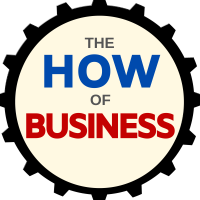
The How of Business Podcast – Business Taxes Episodes
These episodes of The How of Business podcast are all about Small Business Taxes, including federal income taxes and tax strategies for small business owners.
Small Business Taxes
Small business owners need to navigate a variety of taxes, and the specific types can depend on the business structure, location, and nature of the business. It’s imperative that you consult with a receive guidance from a CPA or Tax Attorney, at least annually, to help you understand your tax obligations and help you complete the required tax filings.
Here are some common types of taxes that small business owners may need to be concerned with:
- Income Tax: This is a tax on the profits of the business. For sole proprietorships, partnerships, and S corporations, profits are typically taxed as personal income to the owners. C corporations are taxed separately on their profits, and any distributions to the shareholder are also subject to taxation at the personal level.
- Self-Employment Tax: For sole proprietors, independent contractors, and partners in a partnership, self-employment tax covers Social Security and Medicare taxes. This is particularly relevant for those who don’t have taxes withheld from their paychecks.
- Payroll Taxes: If you have employees, you are responsible for withholding payroll taxes from their wages. This includes federal and state income taxes, as well as Social Security and Medicare taxes. Employers also pay a matching amount of Social Security and Medicare taxes, and federal unemployment tax (FUTA). We recommend that you immediately pay your payroll taxes (through electronic filing) after each payroll run.
- State Sales Tax: If your small business sells goods or certain services, you may need to collect and remit sales tax. The applicability and rate of sales tax can vary greatly depending on the state and locality. Consult with your CPA is you have questions about sales tax collection and remittance to the state.
- Property Tax: If your business owns real property, such as land or buildings, you’ll likely owe property tax to local governments. In some jurisdictions, other business property like equipment may also be subject to Property Taxes. The rate and method of assessment vary by location.
- Excise Taxes: These are taxes on specific goods or services, like gasoline, alcohol, and tobacco. If your business deals with these products, you may need to pay excise taxes.
- Corporate Taxes: For businesses structured as C corporations, corporate taxes are levied on the profits of the corporation. This is separate from the personal income tax owners or shareholders might pay on dividends received.
- Estimated Taxes: Small business owners and self-employed individuals often need to make estimated tax payments throughout the year. This is especially important if your business doesn’t withhold taxes on your income.
- Franchise Taxes: Some states require businesses to pay a franchise tax (this applies to all businesses, not just franchises) for the privilege of being incorporated or registered to do business in that state.
- Value-Added Tax (VAT): In some countries (including Canada), businesses must pay VAT, a consumption tax placed on a product whenever value is added at each stage of the supply chain.
Understanding and managing these taxes is crucial for small business owners. It’s advisable to consult with a tax professional to ensure compliance and to take advantage of any available tax deductions and credits. Remember, tax laws can vary significantly depending on your location and the structure of your business.
Government Tax Resources
Here are some recommended government tax resources:
- Internal Revenue Service (IRS) – Small Business and Self-Employed Tax Center: This resource offers comprehensive information on various tax issues for small businesses and self-employed individuals. IRS Small Business and Self-Employed Tax.
- U.S. Small Business Administration (SBA) – Business Taxes: The SBA provides a guide to the types of taxes you need to know about as a small business owner.
- Electronic Federal Tax Payment System (EFTPS): For making federal tax payments, including payroll taxes and estimated taxes.
- State and Local Tax Resources: Since state and local tax requirements vary, it’s important to check with your state’s department of revenue or equivalent. Here’s a directory for state tax departments: State Tax Departments
- IRS – Understanding Employment Taxes: For information on federal employment taxes if you have employees.
- USA.gov – Starting a Business: This page includes links to various federal and state tax resources for businesses.
- Department of Labor – Payroll Taxes and Federal Unemployment Taxes: For information on payroll and unemployment taxes.
Remember, tax laws and regulations can be complex and are subject to change. It’s always a good idea to consult with a tax professional or accountant who can provide advice tailored to your specific small business situation.


